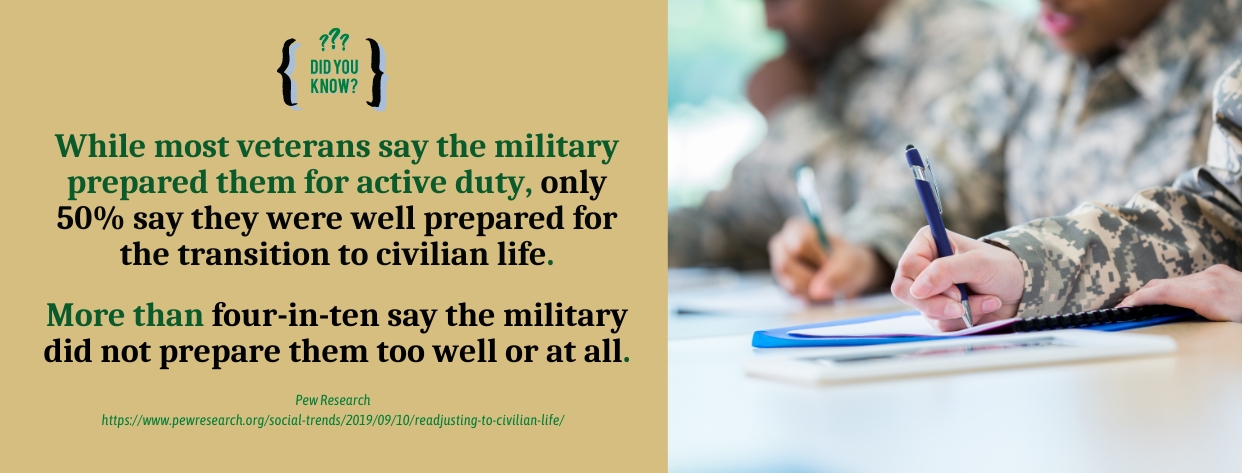Find Your Perfect School
According to Navy Federal, an estimated 250,000 military members in the United States transition into civilian life every year. With the kind of discipline, problem-solving skills, and leadership that our troops possess, there is no doubt that they will make a valuable asset even after transitioning as civilians.
Because of the numerous options that military personnel have after leaving the service, it will be relatively easy for them to do civilian jobs and find their place in society. However, some veterans may not be sure what career paths to choose after leaving the military. This is why it will be wise to know your options before ending your tour and living outside war zones.
Additional Info: Military Positions That Require a Degree
Employment After Service: Top 10 Military Jobs That Translate to the Civilian World
Transitioning from a military occupational specialty to the civilian workforce can be quite daunting. It is quite a huge move, especially for members of the armed forces who have never done work outside the service.
Navy Federal collaborated with Hire Heroes USA to determine which civilian jobs meet what most servicemen and women value the most regarding finding a long-term career path.
Hundreds of troops leave the service each year and choose to live everyday lives! Here are ten opportunities identified by veterans as the best options after military service.
Healthcare Jobs
What’s great about landing a healthcare job is that the pay is excellent, even for those with little experience. Retirees or veterans are perfect for any healthcare work because they have the added experience in dealing with highly stressful situations and providing care for a wide range of patients.
Some job opportunities that ex-military personnel can take advantage of when they become civilians include alcohol and drug abuse counseling, healthcare information technology, medical coding, integrative nutrition, healthcare revenue cycle, EMT, paramedics, and lactation and perinatal.
Aside from those, there is also a high demand for registered nurses, dental specialists, mental health counselors, operating room specialists, medical researchers, and administrative roles.
Government Jobs
A Navy Federal study revealed that 25% of those with military occupations end up working in government or public administration one way or another. This is because 1 in 4 servicemen and women perform some government work while still in service. They also get a lot of training and development, helping them learn a wide variety of skills that are helpful in various federal agencies’ staffing needs.
Thankfully, the federal government prioritized hiring vets in 2009 after President Obama signed the Veterans Employment Initiative, an executive order promoting hiring ex-military men and women in the executive branch. Some top federal agencies hiring vets transitioning into civilians include the Social Security Administration, Defense, Justice, Veterans Administration, and Department of Homeland Security.
Defense Contracting Jobs
Many vets still want to be a part of the force even after retiring. Defense contracting jobs are perfect for them because they allow vets to be part of the military but with the freedom of a civilian career.
Some high-paying contracting jobs in the defense industry include ship construction, information technology, intelligence analysis, research and development, aircraft manufacturing, logistics, recruitment, security, space systems, and testing and quality control.
One of the most lucrative jobs in the defense sector, though, is private security contracting. These are hired by for-profit and non-government organizations operating in war zones and destabilized areas, which require private security for their personnel.
Information Technology Jobs
Whether it’s the Army, Navy, Air Force, Coast Guard, Marine Corps, or Space Force, each military branch requires information technology experts caring for existing computer systems and telecommunications networks. Operators of IT equipment are responsible for transmitting, generating, routing, and tracking crucial military communications.
This means they are skilled in operating state-of-the-art land-based Radio Detection and Ranging (RADAR), electronic receivers, and other equipment for transmitting classified information and operational plans.
Information technology jobs that any vet can transition to include computer information systems manager, computer network architect, communications manager, intelligence analyst, procurement agent, business analyst, data entry operator, security analyst, service desk specialist, laboratory analyst, IT help desk, and management technician.
Ex-military personnel without experience in IT can also apply because big tech companies like Google, Microsoft, Cisco, and GoDaddy have pledged to hire military veterans and their spouses.
Financial Services Jobs
According to Military.com, “A good 10% of separated veterans work in some kind of financial services job.” The military trains its finance personnel well. They are taught skills and values that make transitioning to civilian employment easier. On top of that, financial services institutions offer competitive rates and career advancements.
Men and women can use their experience in military jobs that transfer to civilian life to qualify for financial services jobs, including accountants, accounting and budget technicians, accounting clerks, auditors, financial managers, pay analysts, financial planning analysts, financial advisors, and tax specialists.
Education Jobs
Education jobs are some of the most appealing civilian careers to former Marine Corps, Coast Guard, and US Army members. This is because many vets are drawn to mentorship opportunities, team-oriented environments, and ideal work locations. Because of this, 13% of vets with college degrees choose education jobs, including guidance counselors, curriculum development specialists, school administrators, and more.
Law Enforcement and Security Jobs
Because a serviceman like you has an innate desire to protect, you can also work as an Occupational Safety and Health official. You can help ensure work environments are safe not only for the employees but also for the nearby communities.
Retail Jobs
While the retail industry is in no way related to the military, retail jobs have goal-oriented environments, opportunities to be self-motivated, and flexible work schedules. Aside from that, working in a shopping mall or retail outlet offers solid pay, consistency, and clear opportunities for career growth.
Many civilian employers in the retail industry offer many job opportunities to vets. These include roles like sales managers, marketing and branding agents, buyers, clerks, salespersons, cashiers, comparison shoppers, merchandise assistants, sales attendants, storage facility rental clerks, and warehouse logistics specialists.
Manufacturing Jobs
The manufacturing industry offers many great opportunities, even for vets who don’t have a college degree or those over 35 years old. This sector is currently opening 2.5 million jobs in the next decade. What makes it incredibly ideal for veterans is that the culture is quite similar to when they were still in service. Manufacturing firms offer competitive salaries, consistent work schedules, and team-oriented work environments.
You can be a manufacturing package engineer, technician, production associate, helper, first-line manager, data engineer, experimental engineer, maintenance technician, packaging operator, assembler, processing operator, or forklift operator.
Logistics Jobs
Logistics involve acquiring, transporting, and storing resources. Jobs in this industry require management and communication skills to look for prospective buyers and suppliers. Logistics jobs are ideal for those transitioning from military life because you can work without being in a traditional office setting.
Aside from that, vets are well-trained in problem-solving and critical thinking, which is why many transportation and warehousing companies have a high demand for former military men and women, including those who prefer working as freelance or contract workers.
You can be a logistics analyst, procurement agent, global brand supply chain manager, logistics manager, procurement coordinator, field operations coordinator, or maintenance dispatcher. You can also be a motor transport operator operating various equipment and vehicles to transport, load, and unload cargo and personnel in various locations.
Check this out: The Best Online Associates in Interdisciplinary Studies Degrees
Other Excellent Career Opportunities For Veterans
Aside from those mentioned above, many other job opportunities formerly enlisted personnel can take advantage of. These include the following:
Technical Engineers
An army technical engineer can get a job as a civilian overseeing construction site developments, including drafting, surveying, and making specifications. You will also be tasked to perform lab and field tests on construction materials, draw electrical and plumbing diagrams, and create topographical charts and maps. Plus, you’ll need to provide technical support during construction projects, using GPS to conduct geodetic surveys and build scale models.
Wheeled Vehicle Mechanic
As a wheeled vehicle mechanic, you must handle the maintenance and repair of tactical and armored vehicles. You will also be tasked to check, replace, and adjust a vehicle’s components and systems, including its electrical systems, to ensure optimal performance.
Interpreter and Translator
If you have studied foreign languages while in the service, you can be an interpreter or translator to further military operations in foreign countries when you transition to civilian life. You can also help with legal proceedings and translate statements during conferences or other events in foreign countries.
Administrative Specialist
You will be typing out correspondence and proofreading documents before they are delivered. You will also assemble the final products for authentication, prepare mail for dispatch, and sort and route correspondence. Additionally, you will need to maintain various files, pick up certified mail, sign receipts, and receive publications.
Air Traffic Controller
As an air traffic control operator, you will monitor airplanes and provide takeoff and landing instructions. You will also direct people on the ground and in flight to ensure that all pilots and passengers are safe. Also, you will be helping with the installation and relocation of control sites.
Paralegal
A paralegal will provide legal and administrative support, prepare legal documents, including court-martials and justice law matters, and assist lawyers in wills, family laws, and powers of attorney. You will also be tasked to maintain law library files and records.
Firefighter
You will be a great firefighter if you’re genuinely passionate about saving lives. Aside from putting out fires, you’ll also need to oversee rescue operations during emergencies, such as aircraft crash accidents, vehicle accidents, and structural fires. You must direct paramedics and other emergency response personnel during an operation and maintain fire incident records.
Dog Handler
If you’re passionate about training and caring for dogs, especially during your time in the military, you can be a dog handler and work independently. You can also work with law enforcement, search and rescue teams, dog shelters, or kennels.
According to LinkedIn, being a freelance dog handler is one of the best contracting jobs vets can get hired for.
Summary Points
Before saying goodbye to a military career, it makes sense to plan a career path well and set expectations of average salary and expenses. You’ll also need to consider your insurance and retirement savings. This is why you must carefully choose the civilian job you will do to have enough money for retirement. You should have two to three career interests to have plenty of options. You will then need to list the education, experience, and skills necessary to pursue those jobs.
Although many civilian employers have high regard for men and women with military experience, you must put your best foot forward to ensure that they will see the value you will be able to add to their business. With that said, you need to choose a resume format that will explicitly showcase your military experience and the intangible skills that will make you a top candidate for the job opportunities you will be applying for.
It would also be wise to seek support from non-profit organizations, local government units, and learning institutions that offer programs that help former members of the armed forces to increase your chances of landing a job that not only pays well but also offers you satisfaction and security.
An Additional Resource: The Best Online Associates in Political Science Degrees











